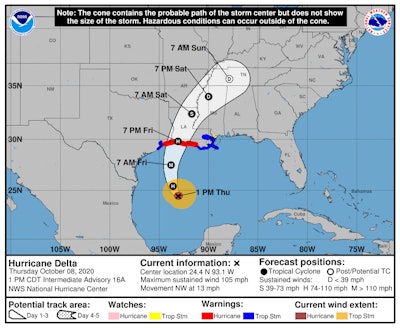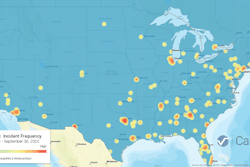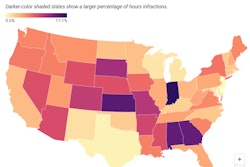Trucking news and briefs for Thursday, Oct. 8, 2020:
 Hurricane Delta is expected to make landfall Friday afternoon or evening along the Louisiana coast.
Hurricane Delta is expected to make landfall Friday afternoon or evening along the Louisiana coast.Hurricane Delta prompts HOS suspension in five states
Another hurricane is forecast to hit the Gulf Coast near the Texas-Louisiana state line Friday evening. In preparation for potential damage to the region, the Federal Motor Carrier Safety Administration has issued an emergency declaration, suspending hours of service regulations for emergency relief haulers responding to the storm.
States included in the declaration are Alabama, Florida, Louisiana, Mississippi and Texas. The waiver covers drivers providing direct relief transporting supplies, goods, equipment and fuel into the affected areas.
According to the National Hurricane Center, Hurricane Delta is expected to make landfall as a major hurricane Friday evening. Strong winds, storm surge and rain totals of up to 15 inches in some areas are expected.
Over 128k Freightliner Cascadias recalled for potential brake light issue
Daimler Trucks North America is recalling more than 128,000 Freightliner Cascadia trucks over a potential brake lights issue, according to National Highway Traffic Safety Administration documents.
Daimler is recalling approximately 128,269 model year 2017-2021 Cascadia tractors due to the brake lights possibly remaining illuminated after the brake pedal has been released.

DTNA will notify owners, and dealers will replace the 3-pin brake pressure switch with a 2-pin switch along with a jumper harness for free.
Owners can contact DTNA customer service at 1-800-547-0712 with recall number FL-863. NHTSA’s recall number is 20V-567.
Colorado authorities stopping trucks to warn of Wolf Creek Pass
The Colorado Department of Transportation and Colorado State Patrol are conducting safety checks of commercial trucks at the summit of Wolf Creek Pass (U.S. 160) in southwest Colorado to interview truckers and inform them of tight turns on the pass and more.
CSP said there were 47 truck crashes on the west side of the eight-mile Wolf Creek Pass from 2015 to 2019, with three of those crashes resulting in fatalities.
“Stopping CMVs and talking with drivers has proven successful,” said CSP Capt. Adrian Driscoll. “Past safety checks have coincided with construction projects on the pass. Letting drivers know what they are in for, coming down the pass can prevent a potential crash, so we’re going to pick those efforts up again.”
CDOT has maintained an educational campaign called Beware The Wolf to arm truckers with what to expect and how to deal with this stretch of highway in the San Juan Mountains.
The agency said most of the crashes on Wolf Creek Pass occurred at the switchback curve near the Wolf Creek scenic lookout area, as a result of drivers going too fast and often losing their brakes. The speed limit for trucks traveling westbound downhill from the summit is 25 miles per hour.
According to the agency, truckers traversing Wolf Creek Pass should:
- Check their brakes before descending the pass
- Maintain a low speed in low gear, and use flashers to warn other vehicles of your speed
- Do not ride the truck’s brakes; this will cause overheating and possible loss of the brake system
- Consider using the truck’s Jake brake to help control the speed of a heavy truck. However, the best practice is to remain in a low gear to avoid overheating.
- Keep brakes cool by pulling into brake stations, or onto the shoulder of the road, if they can locate a safe spot
“If a truck driver has lost control, there should never be a hesitation to use the runaway ramps,” Driscoll noted. “If a truck’s brakes fail due to overheating or excessive use going downhill, runaway ramps are the only way the truck will be able to stop.”









